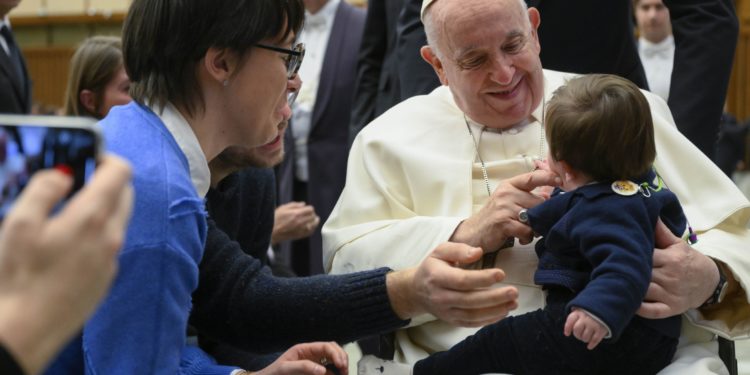“Those who witness to Christ show the beauty of the goal rather than the toil of the journey,” he said.
3. Light
Referring to Isaiah’s prophecy that one would come to “bring sight to the blind,” the pope noted that the restoration of sight is something new that came with Christ.
“It is striking that throughout the Bible, before Christ, the healing of a blind man never appears, never. It was indeed a promised sign that would come with the Messiah,” he said.
The light that Christ brings, he said, is one of a relationship with God.
“He brings us the light of sonship: He is the beloved Son of the Father, living forever; with him we too are children of God loved forever, despite our mistakes and faults,” the pope said.
4. Healing
Pope Francis devoted the majority of his catechesis to the subject of “healing,” particularly healing from guilt and the burdens of sin.
“Jesus says he came ‘to set at liberty those who are oppressed,’” the pope said.
“The oppressed are those in life who feel crushed by something that happens: sickness, labors, burdens on the heart, guilt, mistakes, vices, sins.”
“We think of the sense of guilt, for example. How many of us have suffered this?” the pope asked.
(Story continues below)
“But the good news is that with Jesus, this ancient evil, sin, which seems invincible, no longer has the last word,” he said.
“Those who carry burdens need a caress for the past. So many times we hear, ‘But I would need to heal my past,’” he said.
“Brothers, sisters, do not forget: God forgets everything. How so? Yes, he forgets all our sins. That he forgets. That’s why he has no memory. God forgives everything because he forgets our sins. Only he wants us to draw near to the Lord and he forgives us everything,” the pope continued.
5. Wonder
When Jesus says he came “to proclaim the acceptable year of the Lord” (Luke 4:19), the pope explained, he was declaring a “jubilee” — but “not a scheduled jubilee” such as we have today.
Credit: Source link




